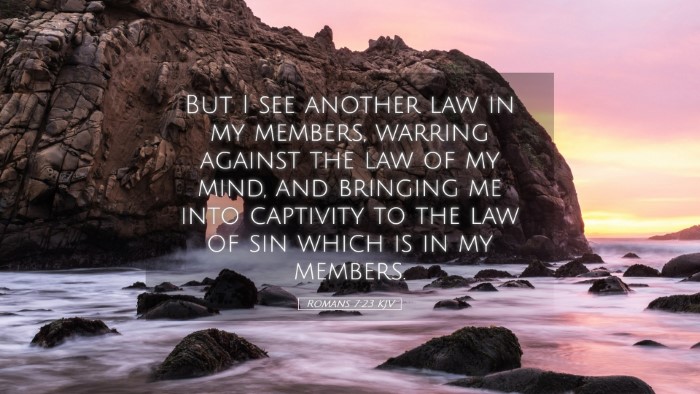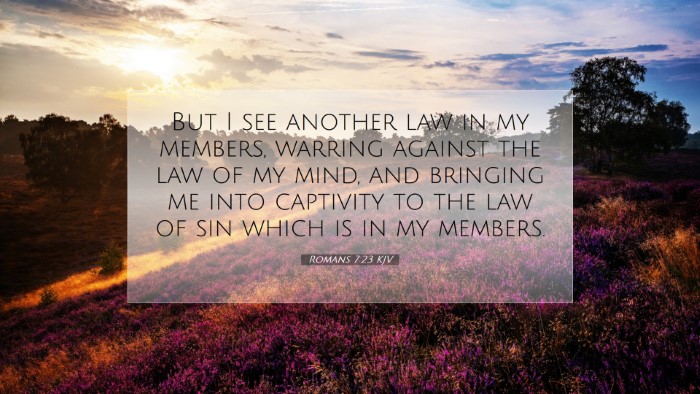Old Testament
Genesis Exodus Leviticus Numbers Deuteronomy Joshua Judges Ruth 1 Samuel 2 Samuel 1 Kings 2 Kings 1 Chronicles 2 Chronicles Ezra Nehemiah Esther Job Psalms Proverbs Ecclesiastes Song of Solomon Isaiah Jeremiah Lamentations Ezekiel Daniel Hosea Joel Amos Obadiah Jonah Micah Nahum Habakkuk Zephaniah Haggai Zechariah MalachiRomans 7:23
Romans 7:23 KJV
But I see another law in my members, warring against the law of my mind, and bringing me into captivity to the law of sin which is in my members.
Romans 7:23 Bible Commentary
Commentary on Romans 7:23
Verse Text: “But I see another law in my members, warring against the law of my mind, and bringing me into captivity to the law of sin which is in my members.”
Introduction
The Apostle Paul's struggle with sin is a central theme in Romans 7, particularly in verse 23. This verse encapsulates the inner conflict of a believer as they wrestle with the dichotomy of their new spiritual nature and the remnants of the old sinful nature. Drawing from the insights of reputable public domain commentaries, this analysis aims to expound on the theological, practical, and pastoral implications of this profound verse.
The Conflict of Laws
Paul describes a duality in his experience: one governing law is recognized in the mind, while another operates within the body. This struggle is not simply a personal experience; it is emblematic of the larger human experience in the context of sin and redemption.
- Matthew Henry: Matthew Henry emphasizes that the “law in my members” refers to the corrupt elements of human nature that oppose God’s law. He asserts that while Paul's mind desires to obey God's will, the flesh continues to lead him into sin.
- Albert Barnes: Barnes elaborates by explaining that the “law of sin” signifies the corrupted desires and impulses that induce one to act contrary to God's statutes. He notes that the presence of such a law serves to highlight human weakness and the necessity for divine grace.
- Adam Clarke: Clarke offers a psychological perspective, describing this internal struggle as a form of captivity. He argues that the “war” between the influences of the mind and the body illustrates the believer’s ongoing battle against sin, a battle that only intensifies in the life of faith.
The Tension of Spiritual Warfare
This inner conflict portrays a vivid picture of spiritual warfare, where the mind longs to pursue righteousness while the flesh pulls toward sin. Such tension is reflective of the transformative journey of believers seeking to embody the character of Christ.
- Spiritual Awareness: Acknowledging this internal battle is crucial for spiritual maturity. It prepares believers for the reality of temptation and the constant need for vigilance in their walk with God.
- Dependence on Grace: The fight against sin underscores the believer's utter dependence on divine grace. As Paul would conclude in Romans 7:24-25, the answer lies not in human effort but in Jesus Christ, through whom triumph is achieved.
The Role of the Law
Paul's reference to the “law” can be viewed through the lens of both the Mosaic Law and the moral law written on the hearts of believers. Here we must differentiate between the laws that guide righteousness and the sinful inclinations that misuse those very laws.
- Henry on the Law: Matthew Henry posits that while the law serves as a mirror reflecting sin, it is insufficient for salvation. It exposes sin but does not eradicate it, leading believers to recognize their need for Christ.
- Barnes on the Dichotomy: Barnes highlights that the law, rather than suppressing sin, often incites sinful desires, leading to a paradoxical scenario where the moral awareness magnifies culpability.
- Clarke on the Purpose of the Law: According to Clarke, the law's purpose is not merely to condemn but to guide believers toward the grace found in Christ, emphasizing that hope lies in the new creation rather than in the old nature bound by sin.
The Implications for Believers
Understanding Romans 7:23 provides profound implications for those who seek to live according to the Spirit in a fallen world.
- Embracing the Struggle: Believers are encouraged to acknowledge their struggle with sin without succumbing to despair. Recognizing the duality of existence allows for genuine reliance on God’s grace and power.
- Active Resistance: This verse serves as a call to active spiritual resistance. Pastors, theologians, and students are reminded to engage in disciplines like prayer, Bible study, and fellowship, which strengthen the spirit against carnal inclinations.
- Hope in Deliverance: As Paul transitions to the proclamation of deliverance in Christ, believers are comforted by the assurance that while sin persists, victory is assured through faith in Jesus—a central tenet for Christian teaching.
Conclusion
Romans 7:23 is not merely a depiction of internal conflict; it is a deep theological statement about the nature of sin and grace. By synthesizing insights from Matthew Henry, Albert Barnes, and Adam Clarke, we gain a multi-faceted understanding of the believer's condition in light of sin and highlight the necessary response of reliance on Christ. This enduring struggle, while daunting, is both a testament to the active work of the Holy Spirit and a prelude to the joy of deliverance. The call to believers, therefore, is not to despair in their struggles but rather to cling fiercely to the hope and strength offered in Christ.


